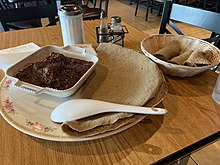Zigni
 Zigni with injera | |
| Type | Entrée |
|---|---|
| Place of origin | |
| Region or state | East Africa |
| Main ingredients | meat, tomatoes, red onions and Berbere spices |
Zigni (Tigrinya: ዝግኒ), kaih tsebhi (Tigrinya: ቀይሕ ጸብሒ) or kai wat (Amharic: ቀይ ወጥ)[1][2] is a popular Eritrean and Ethiopian stew (tsebhi or wat) made from meat, tomatoes, red onions and Berbere spices.[1] The meat can be beef, lamb, goat, or chicken and usually placed on a plate of injera, a type of unleavened bread made from teff flour.[3][4][5][6] It can be eaten for lunch or dinner.[1] The dish requires a relatively long amount of time but not a lot of active effort to make.[1] The traditional recipe can take as long as five to six hours to prepare.[6] As such, it is sometimes reserved for special occasions.[6] The Berbere spices can make the zigni spicy and give it a red color.[1][5]
It is considered to be the national dish of Eritrea.[1][2]
Background[edit]
A traditional component of Eritrean cuisine is tsebhi, which are meat stews served with injera.[5] This is similar to Ethiopian cuisine, as the history is shared by both groups of people.[5] However, Ethiopians use Amharic names whereas Eritreans use Tigrinya names.[7] There are also similarities with Somali cuisine.[5] Eritreans also tend to use less seasoned butter than the Ethiopian counterparts, making the dishes a bit lighter.[7] The Italians colonized Eritrea which influenced the dish.[8] For example, the use of tomatoes demonstrates the Italian influence.[7] Cumin and curry powders reflects the Middle Eastern influence.[7]
Preparation[edit]
The meat is first cooked and then tomatoes and red onions are added.[1] After being slow cooked for hours, the spices are added.[1] The dish also traditionally uses a clarified butter called t’esmi that resembles ghee but is seasoned with herbs and spices.[1]
Storage[edit]
In an airtight container, zigni can be stored for three days in the refrigerator or one month in the freezer.[6]
References[edit]
- ^ a b c d e f g h i The Foreign Fork (2021-02-17). "Zigni (Beef Stew from Eritrea)". The Foreign Fork. Retrieved 2021-08-23.
- ^ a b Cuisine, International (2015-06-11). "Zigni (Beef Stew)". International Cuisine. Retrieved 2021-08-23.
- ^ Dowdney, S.P. (2011). Putting Up more. Gibbs Smith. p. 135. ISBN 978-1-4236-1516-3. Retrieved 2021-08-23.
- ^ NgCheong-Lum, R.; Orr, T. (2020). Eritrea. Cultures of the World (Third Edition). Cavendish Square Publishing LLC. p. 125. ISBN 978-1-5026-5578-3. Retrieved 2021-08-23.
- ^ a b c d e Abitbol, Vera (2013-12-29). "Zigni". 196 flavors. Retrieved 2021-08-23.
- ^ a b c d Shroff, Nicole (2021-03-16). "Zigni". End of the Fork. Retrieved 2021-08-23.
- ^ a b c d "Around the World in 80 Dishes: Eritrea". Chef Bolek. Retrieved 2021-08-23.
- ^ Cuisine, International (2015-06-11). "Zigni (Beef Stew)". International Cuisine. Retrieved 2021-08-23.
